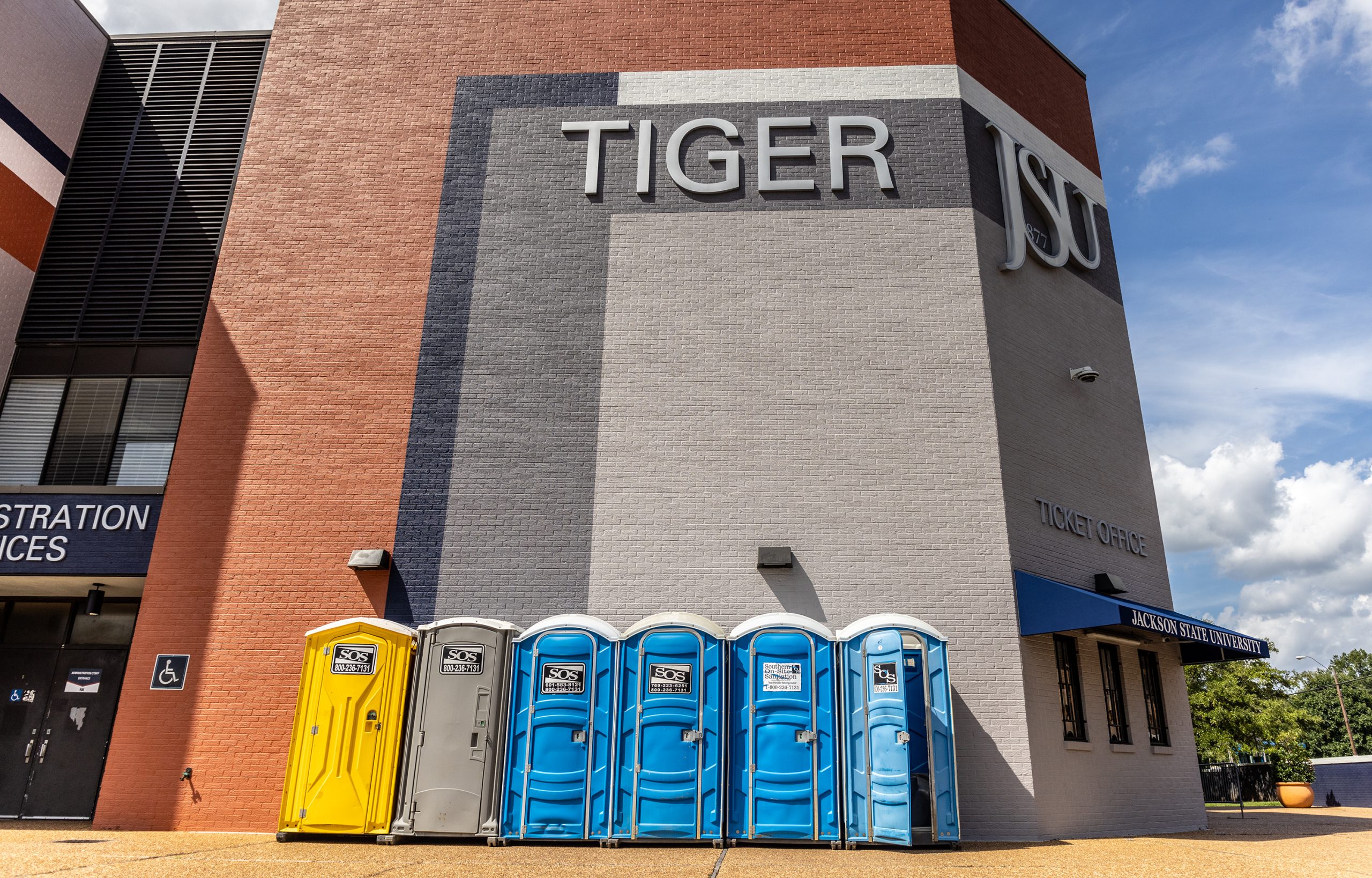Mississippi Today
JSU students pleading for fixes to campus water system as officials quietly seek funding

JSU students pleading for fixes to campus water system as officials quietly seek funding
While Jackson State University officials are quietly working to pull funding for an improved campus water system, students continue to complain of inadequacies.
The historically Black university, situated in the oldest neighborhood in the capital city, has struggled with unreliable water for years — even when there’s not an acute crisis.
Students who live in on-campus dorms are particularly struggling. The aging cast iron and lead lines under the university routinely burst, which can make the water smell foul or turn brown. In the winter, freezing temperatures have left students without heat, because the system relies on running water. They’ve had to buy bottled water, use portable showers and live in hotels.
These conditions make it more difficult for students to focus on the reason they’re at Jackson State — to learn. And, the problems could hurt the university’s bottom line: Enrollment.
Former President Thomas Hudson — before he was placed on administrative leave —had pledged to get clean, safe water at Jackson State. One of his priorities this session was a $17 million request for state funding for campus infrastructure, including the water system. That goal, Hudson had indicated, has the support of the governor and lieutenant governor. Several lawmakers have introduced bills to get the university funding for projects related to its water system.
Before Hudson was placed on leave, the university had declined to comment on its efforts. His temporary replacement, Elayne Hayes-Anthony, has said she will continue to support the university’s legislative priorities. Concrete details from the lawmakers have been hard to come by.
Now, some students say they want to know what exactly the university’s administration has been doing to fix the problems on campus.

“Not knowing only adds suspicion to where it’s actually going,” Amaya Baker, a junior, said of the university’s quest for funds.
Baker says it seems like the problems are never-ending in her dorm. Hot water has returned to showers, however, some residents’ washing machines are broken.
There is one plus side: Baker started at Jackson State in the fall of 2020, while pandemic restrictions were in place. Now, she can at least spend more time with friends.
Jackson State is a public institution supported by the state of Mississippi. Tatyana Ross, a senior, said the university shouldn’t have to beg for state funding.

At the end of the day, administrators can request more money, but that doesn’t mean lawmakers will approve it, Ross said.
“It’s not new: Jackson State started off as a school for Negro teachers,” Ross said. “It feels like the state government continues to attempt and disrupt the education of Black people. I believe that it all shows how oppressed African Americans remain in today’s time.”
Hudson said in a February interview that his administration is working to get funds for the university to build its own campus water supply, new water lines and a “redundant water supply” in case the city’s supply fails again.
The university has declined to discuss the administration’s efforts to get a new water supply.
Alonda Thomas, the university’s communications director, wrote in a February email that JSU did not want to discuss its legislative efforts to get a new water system.
“We’re going to pass at this time,” she wrote. “We’ll wait until the session closes and if the study is approved, we’ll discuss the findings once the study is conducted.”
An opaque funding process
At a town hall last year, Hudson told students the first step to securing funding for a new water system on campus is to get money for a study. It’s a process similar to the one Jackson State undertook to get funding for a stadium feasibility study. A feasibility study looks at a range of factors to determine how possible a construction project is.
The university is already pursuing water-related projects using about $2 million in federal pandemic relief funds that flowed through the Department of Finance and Administration. A spokesperson for the department said the details of those projects aren’t yet finalized.
In a statement, Michael Bolden told Mississippi Today and Open Campus that the funds from DFA will provide an “intermediate solution” for the water issues on campus and “a more comprehensive plan for the entire campus.”
“The initial funds provided will inform the details of a more comprehensive emergency water delivery system during times of low to no water pressure events,” the executive director of campus operations said.
So far this session, four measures seeking funding for Jackson State infrastructure improvements —House Bill 189, House Bill 1353, House Bill 1389 and Senate Bill 2969 — have died in committee.
But, this is typical. In the Mississippi Legislature, stalled proposals seeking appropriations or bond funding are often revived in one large bill toward the end of session.
Sen. Derrick Simmons, D-Greenville, said of his bill (SB 2969) that “it was important to file so it could be of record, but if the bill dies … it’s not like all is lost.”
Simmons’ appropriations bill asked for $8 million “for the purpose of defraying the expenses of repair, renovation and/or upgrades to the university’s water system and related infrastructure.” He said an university official from external affairs said that’s how much the university would need, but he couldn’t say if it would go toward a study or to actual infrastructure improvements.
Simmons said he proposed the bill because he’d heard concerns that the city’s water crisis has led to declining enrollment at JSU.

Students echoed that concern. Alora Arnold, a senior, said she regrets the decision to attend JSU because of the ongoing water issues.
Her full scholarship is what has kept her in Jackson.
“Had that not been the case, I would definitely transfer,” Arnold said.
Rep. Angela Cockerham, I-Magnolia, filed two similar bills that also requested $8 million in appropriations. She did not return multiple calls and texts from Mississippi Today.
Four Mississippi universities have their own water systems, according to the Institutions of Higher Learning, including Alcorn State University, Mississippi Valley State University, Mississippi State University, and the University of Mississippi.
The University of Mississippi Medical Center uses its own water source for about 90% of campus with the remaining coming from the city, according to the Institutions of Higher Learning.

Matthew Adams, a junior, says the water issues on campus have left him feeling alone and dampened his social life.
“When you’re not able to shower because we’re without water or the showers aren’t getting warm, you don’t feel clean and you stink. I truly feel isolated. My dorm only has one working washing machine, so it’s hard to even get clean clothes.”
Rep. John Hines, D-Greenville, was the third lawmaker to file a bill that would have gotten Jackson State money for infrastructure improvements. He noted one reason for the water troubles at Jackson State is that lawmakers have historically underfunded Mississippi’s HBCUs compared to the predominantly white institutions.
“I doubt if it passes simply because they really don’t want to admit that they had made the failures in providing funding for these institutions,” he said earlier in the session before the bill died.
In the meantime, Jackson State is also turning to private funding.
Bolden said the university has a pot of money — called the Jackson State University Gap Emergency Fund —that can supplement on-campus resources meant to help students navigate the problems. Other services he discussed include on-site counseling and the campus’s food pantry that offers bottled water, canned goods and personal hygiene products.

Jaiden Smith, a sophomore, returned home to St. Louis temporarily from Sept.1 to 3 last year during the water crisis. At that point in the crisis, students had gone days without laundry service and water on the upper floors. The university had to set up portable showers.
“I didn’t want to go to class or do fun events on campus because I couldn’t enjoy the basic necessities of a nice shower,” she said.
Molly Minta covers higher education for Mississippi Today, in partnership with Open Campus. Alivia Welch is an inaugural fellow in the HBCU Student Journalism Network, a project of Open Campus.
This article first appeared on Mississippi Today and is republished here under a Creative Commons license.
Mississippi Today
Mississippi River flooding Vicksburg, expected to crest on Monday
Warren County Emergency Management Director John Elfer said Friday floodwaters from the Mississippi River, which have reached homes in and around Vicksburg, will likely persist until early May. Elfer estimated there areabout 15 to 20 roads underwater in the area.
“We’re about half a foot (on the river gauge) from a major flood,” he said. “But we don’t think it’s going to be like in 2011, so we can kind of manage this.”
The National Weather projects the river to crest at 49.5 feet on Monday, making it the highest peak at the Vicksburg gauge since 2020. Elfer said some residents in north Vicksburg — including at the Ford Subdivision as well as near Chickasaw Road and Hutson Street — are having to take boats to get home, adding that those who live on the unprotected side of the levee are generally prepared for flooding.



“There are a few (inundated homes), but we’ve mitigated a lot of them,” he said. “Some of the structures have been torn down or raised. There are a few people that still live on the wet side of the levee, but they kind of know what to expect. So we’re not too concerned with that.”
The river first reached flood stage in the city — 43 feet — on April 14. State officials closed Highway 465, which connects the Eagle Lake community just north of Vicksburg to Highway 61, last Friday.

Elfer said the areas impacted are mostly residential and he didn’t believe any businesses have been affected, emphasizing that downtown Vicksburg is still safe for visitors. He said Warren County has worked with the U.S. Army Corps of Engineers and the Mississippi Emergency Management Agency to secure pumps and barriers.
“Everybody thus far has been very cooperative,” he said. “We continue to tell people stay out of the flood areas, don’t drive around barricades and don’t drive around road close signs. Not only is it illegal, it’s dangerous.”
NWS projects the river to stay at flood stage in Vicksburg until May 6. The river reached its record crest of 57.1 feet in 2011.




This article first appeared on Mississippi Today and is republished here under a Creative Commons Attribution-NoDerivatives 4.0 International License.![]()
Mississippi Today
With domestic violence law, victims ‘will be a number with a purpose,’ mother says
Joslin Napier. Carlos Collins. Bailey Mae Reed.
They are among Mississippi domestic violence homicide victims whose family members carried their photos as the governor signed a bill that will establish a board to study such deaths and how to prevent them.
Tara Gandy, who lost her daughter Napier in Waynesboro in 2022, said it’s a moment she plans to tell her 5-year-old grandson about when he is old enough. Napier’s presence, in spirit, at the bill signing can be another way for her grandson to feel proud of his mother.
“(The board) will allow for my daughter and those who have already lost their lives to domestic violence … to no longer be just a number,” Gandy said. “They will be a number with a purpose.”
Family members at the April 15 private bill signing included Ashla Hudson, whose son Collins, died last year in Jackson. Grandparents Mary and Charles Reed and brother Colby Kernell attended the event in honor of Bailey Mae Reed, who died in Oxford in 2023.
Joining them were staff and board members from the Mississippi Coalition Against Domestic Violence, the statewide group that supports shelters and advocated for the passage of Senate Bill 2886 to form a Domestic Violence Facility Review Board.
The law will go into effect July 1, and the coalition hopes to partner with elected officials who will make recommendations for members to serve on the board. The coalition wants to see appointees who have frontline experience with domestic violence survivors, said Luis Montgomery, public policy specialist for the coalition.
A spokesperson from Gov. Tate Reeves’ office did not respond to a request for comment Friday.
Establishment of the board would make Mississippi the 45th state to review domestic violence fatalities.
Montgomery has worked on passing a review board bill since December 2023. After an unsuccessful effort in 2024, the coalition worked to build support and educate people about the need for such a board.
In the recent legislative session, there were House and Senate versions of the bill that unanimously passed their respective chambers. Authors of the bills are from both political parties.
The review board is tasked with reviewing a variety of documents to learn about the lead up and circumstances in which people died in domestic violence-related fatalities, near fatalities and suicides – records that can include police records, court documents, medical records and more.
From each review, trends will emerge and that information can be used for the board to make recommendations to lawmakers about how to prevent domestic violence deaths.
“This is coming at a really great time because we can really get proactive,” Montgomery said.
Without a board and data collection, advocates say it is difficult to know how many people have died or been injured in domestic-violence related incidents.
A Mississippi Today analysis found at least 300 people, including victims, abusers and collateral victims, died from domestic violence between 2020 and 2024. That analysis came from reviewing local news stories, the Gun Violence Archive, the National Gun Violence Memorial, law enforcement reports and court documents.
Some recent cases the board could review are the deaths of Collins, Napier and Reed.
In court records, prosecutors wrote that Napier, 24, faced increased violence after ending a relationship with Chance Fabian Jones. She took action, including purchasing a firearm and filing for a protective order against Jones.
Jones’s trial is set for May 12 in Wayne County. His indictment for capital murder came on the first anniversary of her death, according to court records.
Collins, 25, worked as a nurse and was from Yazoo City. His ex-boyfriend Marcus Johnson has been indicted for capital murder and shooting into Collins’ apartment. Family members say Collins had filed several restraining orders against Johnson.
Johnson was denied bond and remains in jail. His trial is scheduled for July 28 in Hinds County.
He was a Jackson police officer for eight months in 2013. Johnson was separated from the department pending disciplinary action leading up to immediate termination, but he resigned before he was fired, Jackson police confirmed to local media.
Reed, 21, was born and raised in Michigan and moved to Water Valley to live with her grandparents and help care for her cousin, according to her obituary.
Kylan Jacques Phillips was charged with first degree murder for beating Reed, according to court records. In February, the court ordered him to undergo a mental evaluation to determine if he is competent to stand trial, according to court documents.
At the bill signing, Gandy said it was bittersweet and an honor to meet the families of other domestic violence homicide victims.
“We were there knowing we are not alone, we can travel this road together and hopefully find ways to prevent and bring more awareness about domestic violence,” she said.
This article first appeared on Mississippi Today and is republished here under a Creative Commons Attribution-NoDerivatives 4.0 International License.
Mississippi Today
Court to rule on DeSoto County Senate districts with special elections looming
A federal three-judge panel will rule in coming days on how political power in northwest Mississippi will be allocated in the state Senate and whether any incumbents in the DeSoto County area might have to campaign against each other in November special elections.
The panel, comprised of all George W. Bush-appointed judges, ordered state officials last week to, again, craft a new Senate map for the area in the suburbs of Memphis. The panel has held that none of the state’s prior maps gave Black voters a realistic chance to elect candidates of their choice.
The latest map proposed by the all-Republican State Board of Election Commissioners tweaked only four Senate districts in northwest Mississippi and does not pit any incumbent senators against each other.
The state’s proposal would keep the Senate districts currently held by Sen. Michael McLendon, a Republican from Hernando and Sen. Kevin Blackwell, a Republican from Southaven, in majority-white districts.
But it makes Sen. David Parker’s district a slightly majority-Black district. Parker, a white Republican from Olive Branch, would run in a district with a 50.1% black voting-age population, according to court documents.
The proposal also maintains the district held by Sen. Reginald Jackson, a Democrat from Marks, as a majority-Black district, although it reduces the Black voting age population from 61% to 53%.
Gov. Tate Reeves, Secretary of State Michael Watson, and Attorney General Lynn Fitch comprise the State Board of Election Commissioners. Reeves and Watson voted to approve the plan. But Watson, according to meeting documents, expressed a wish that the state had more time to consider different proposals.
Fitch did not attend the meeting, but Deputy Attorney General Whitney Lipscomb attended in her place. Lipscomb voted against the map, although it is unclear why. Fitch’s office declined to comment on why she voted against the map because it involves pending litigation.
The reason for redrawing the districts is that the state chapter of the NAACP and Black voters in the state sued Mississippi officials for drawing legislative districts in a way that dilutes Black voting power.
The plaintiffs, represented by the ACLU, are likely to object to the state’s newest proposal, and they have until April 29 to file an objection with the court
The plaintiffs have put forward two alternative proposals for the area in the event the judges rule against the state’s plans.
The first option would place McLendon and Blackwell in the same district, and the other would place McLendon and Jackson in the same district.
It is unclear when the panel of judges will issue a ruling on the state’s plan, but they will not issue a ruling until the plaintiffs file their remaining court documents next week.
While the November election is roughly six months away, changing legislative districts across counties and precincts is technical work, and local election officials need time to prepare for the races.
The judges have not yet ruled on the full elections calendar, but U.S. Fifth Circuit Court of Appeals Judge Leslie Southwick said at a hearing earlier this month that the panel was committed have the elections in November.
This article first appeared on Mississippi Today and is republished here under a Creative Commons Attribution-NoDerivatives 4.0 International License.
-

 News from the South - Florida News Feed6 days ago
News from the South - Florida News Feed6 days agoJim talks with Rep. Robert Andrade about his investigation into the Hope Florida Foundation
-

 News from the South - Arkansas News Feed7 days ago
News from the South - Arkansas News Feed7 days agoValerie Storm Tracker
-

 News from the South - Kentucky News Feed7 days ago
News from the South - Kentucky News Feed7 days agoU.S. Supreme Court pauses deportations under wartime law
-

 News from the South - Alabama News Feed4 days ago
News from the South - Alabama News Feed4 days agoPrayer Vigil Held for Ronald Dumas Jr., Family Continues to Pray for His Return | April 21, 2025 | N
-

 Mississippi Today5 days ago
Mississippi Today5 days ago‘Trainwreck on the horizon’: The costly pains of Mississippi’s small water and sewer systems
-

 News from the South - Texas News Feed5 days ago
News from the South - Texas News Feed5 days agoMeteorologist Chita Craft is tracking a Severe Thunderstorm Warning that's in effect now
-

 Mississippi Today7 days ago
Mississippi Today7 days agoOn this day in 1977, Alex Haley awarded Pulitzer for ‘Roots’
-

 News from the South - Virginia News Feed5 days ago
News from the South - Virginia News Feed5 days agoTaking video of military bases using drones could be outlawed | Virginia














































